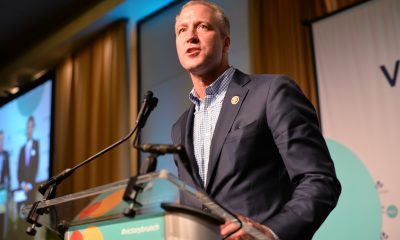National
Newly elected out House members talk LGBT issues
Takano wants Obama to revisit ENDA executive order


The new LGB members of the House. From upper left clockwise: Kyrsten Sinema (photo courtesy Sinema), Mark Takano (photo courtesy Takano), Sean Patrick Maloney (Blade file photo by Michael Key) and Mark Pocan (Blade file photo by Michael Key).
The Nov. 6 election resulted in four new lesbian, gay and bisexual candidates winning seats in the House of Representatives and all eyes are now on them to see what they’ll do on LGBT issues upon taking office.
A number of new faces will join the LGBT representation in Congress: Kyrsten Sinema of Arizona, who’ll be the first openly bisexual member of Congress; Sean Patrick Maloney, who’ll be the first out congressman from New York; Mark Takano of California, who’ll be the first openly gay Asian-American in Congress; and Mark Pocan of Wisconsin, who’ll take lesbian Rep. Tammy Baldwin’s seat in the U.S. House.
Upon taking their seats, a total of seven LGB members will serve in Congress. The four new members will join Baldwin, who’s moving from the House to the Senate, as well as Reps. David Cicilline (D-R.I.) and Jared Polis (D-Colo.), who last week told the Washington Blade he plans on taking the lead on the Employment Non-Discrimination Act in the next Congress.
While participating in training and orientation programs on Capitol Hill, each of the four of the new congresspersons-elect communicated with the Blade about initial plans they have for LGBT issues after being sworn in on Jan. 3 — despite the difficulty of moving any legislation forward in the Republican-controlled House.
Takano said he’s vying for a position of the Committee on Education and the Workforce because the panel has jurisdiction over ENDA and anti-bullying legislation for LGBT students.
“I know ENDA is reintroduced almost every session, and those are two parts of an equality agenda that I’d like to be able to work on,” Takano said. “I’m mindful that we have a Republican majority in the House … I want to spend time building relations with Republicans who might want to join in some aspects of an equality agenda.”
A public school teacher for 23 years specializing in British literature and member of Riverside Community College District’s Board of Trustees, Takano may have the experience that would land him a seat on the committee.
Takano also said he wants President Obama to revisit the idea of an executive order barring federal contractors from discriminating against LGBT workers, which the White House said in April Obama wouldn’t issue at this time.
“President Truman was right to stand on the right side of history when he used his executive powers to integrate the armed forces,” Takano said. “So will President Obama be when he uses his executive authority to bar discrimination in federal contracting against LGBT workers.”
Takano joins Maloney in saying the White House should rethink its position on the issue. The congressman-elect from New York told the Blade over the course of his campaign that he still wants Obama to issue the directive. Pocan said last year — before the White House said “no” — he backs the idea of an executive order.
For his part, Pocan said he’s more focused on getting his office and staff set up as he prepares to take his seat, but said he spoke with Polis about a possible new direction for the LGBT Equality Caucus — a group of House members committed to the advancement of LGBT issues.
“I did sit down with Jared Polis, and we had a good discussion about having the LGBT [Equality] Caucus pool some money and perhaps hire a staffer like some of the other caucuses do,” Pocan said. “That way we could hopefully be even more proactive on issues like ENDA, student non-discrimimation and some of the other bills that are out there.”
Maloney, a staffer in the Clinton White House, was more general when talking about initial plans on LGBT issues after taking his seat, saying his goal is to work toward full equality for the LGBT community.
“I want to continue the work I’ve done for 20 years to secure full equality under federal law,” Maloney said. “I think the most important thing is to work with my colleagues in the House to pass legislation across party lines, and keep focused on a goal, which is full equality under federal law.”
Asked if he could name any bills or initiatives he wants to spearhead, Maloney replied, “I don’t see it as my job to put myself in front of others who have already been working on these issues. It’s my job to support and work cooperatively with folks who’ve been in the fight for years.”
None of the new LGB members of the House were able to identify pieces of legislation for which they want to be chief sponsor or other initiatives they want to spearhead, saying it’s too soon in the process to know where responsibilities will be allocated.
Pocan noted the issues affecting the LGBT community are known and what remains to be decided is the best way to approach them over the course of the next few years.
“Clearly, we know some of the issues that are out there — whether it be ENDA, whether it be tax fairness, whether it be benefits for federal employees, other non-discrimination laws,” Pocan said. “I think it’s just a matter of now figuring out — having seven of us total — how can we best move those forward either through legislation and working with the president to issue orders.”
Sinema issued a statement to the Blade saying she’s “thrilled” the next Congress will be the most inclusive ever and she’s proud to be a part of it. On her to-do list is finding ways to work across the aisle on LGBT issues.
“The first thing I plan to do is what I did while serving in Arizona’s legislature — and that was to seek out members that I often disagreed with on important issues,” Sinema said. “It was through our authentic relationships and mutual respect that we found common ground on legislation that helped people. The challenge for Congress is to move past the harsh partisanship that we saw in the last term. This is a critical step in advancing policies that will strengthen and protect LGBT families.”
NOTE: This story has been updated to include a statement from Kyrsten Sinema.
Pennsylvania
Malcolm Kenyatta could become the first LGBTQ statewide elected official in Pa.
State lawmaker a prominent Biden-Harris 2024 reelection campaign surrogate

Following his win in the Democratic primary contest on Wednesday, Pennsylvania state Rep. Malcolm Kenyatta, who is running for auditor general, is positioned to potentially become the first openly LGBTQ elected official serving the commonwealth.
In a statement celebrating his victory, LGBTQ+ Victory Fund President Annise Parker said, “Pennsylvanians trust Malcolm Kenyatta to be their watchdog as auditor general because that’s exactly what he’s been as a legislator.”
“LGBTQ+ Victory Fund is all in for Malcolm, because we know he has the experience to win this race and carry on his fight for students, seniors and workers as Pennsylvania’s auditor general,” she said.
Parker added, “LGBTQ+ Americans are severely underrepresented in public office and the numbers are even worse for Black LGBTQ+ representation. I look forward to doing everything I can to mobilize LGBTQ+ Pennsylvanians and our allies to get out and vote for Malcolm this November so we can make history.”
In April 2023, Kenyatta was appointed by the White House to serve as director of the Presidential Advisory Commission on Advancing Educational Equity, Excellence and Economic Opportunity for Black Americans.
He has been an active surrogate in the Biden-Harris 2024 reelection campaign.
The White House
White House debuts action plan targeting pollutants in drinking water
Same-sex couples face higher risk from environmental hazards

Headlining an Earth Day event in Northern Virginia’s Prince William Forest on Monday, President Joe Biden announced the disbursement of $7 billion in new grants for solar projects and warned of his Republican opponent’s plans to roll back the progress his administration has made toward addressing the harms of climate change.
The administration has led more than 500 programs geared toward communities most impacted by health and safety hazards like pollution and extreme weather events.
In a statement to the Washington Blade on Wednesday, Brenda Mallory, chair of the White House Council on Environmental Quality, said, “President Biden is leading the most ambitious climate, conservation, and environmental justice agenda in history — and that means working toward a future where all people can breathe clean air, drink clean water, and live in a healthy community.”
“This Earth Week, the Biden-Harris Administration announced $7 billion in solar energy projects for over 900,000 households in disadvantaged communities while creating hundreds of thousands of clean energy jobs, which are being made more accessible by the American Climate Corps,” she said. “President Biden is delivering on his promise to help protect all communities from the impacts of climate change — including the LGBTQI+ community — and that we leave no community behind as we build an equitable and inclusive clean energy economy for all.”
Recent milestones in the administration’s climate policies include the U.S. Environmental Protection Agency’s issuance on April 10 of legally enforceable standard for detecting and treating drinking water contaminated with polyfluoroalkyl substances.
“This rule sets health safeguards and will require public water systems to monitor and reduce the levels of PFAS in our nation’s drinking water, and notify the public of any exceedances of those levels,” according to a White House fact sheet. “The rule sets drinking water limits for five individual PFAS, including the most frequently found PFOA and PFOS.”
The move is expected to protect 100 million Americans from exposure to the “forever chemicals,” which have been linked to severe health problems including cancers, liver and heart damage, and developmental impacts in children.
An interactive dashboard from the United States Geological Survey shows the concentrations of polyfluoroalkyl substances in tapwater are highest in urban areas with dense populations, including cities like New York and Los Angeles.
During Biden’s tenure, the federal government has launched more than 500 programs that are geared toward investing in the communities most impacted by climate change, whether the harms may arise from chemical pollutants, extreme weather events, or other causes.
New research by the Williams Institute at the UCLA School of Law found that because LGBTQ Americans are likelier to live in coastal areas and densely populated cities, households with same-sex couples are likelier to experience the adverse effects of climate change.
The report notes that previous research, including a study that used “national Census data on same-sex households by census tract combined with data on hazardous air pollutants (HAPs) from the National Air Toxics Assessment” to model “the relationship between same-sex households and risk of cancer and respiratory illness” found “that higher prevalence of same-sex households is associated with higher risks for these diseases.”
“Climate change action plans at federal, state, and local levels, including disaster preparedness, response, and recovery plans, must be inclusive and address the specific needs and vulnerabilities facing LGBT people,” the Williams Institute wrote.
With respect to polyfluoroalkyl substances, the EPA’s adoption of new standards follows other federal actions undertaken during the Biden-Harris administration to protect firefighters and healthcare workers, test for and clean up pollution, and phase out or reduce use of the chemicals in fire suppressants, food packaging, and federal procurement.
Maine
Maine governor signs transgender, abortion sanctuary bill into law
Bomb threats made against lawmakers before measure’s passage

BY ERIN REED | On Tuesday, Maine Gov. Janet Mills signed LD 227, a sanctuary bill that protects transgender and abortion providers and patients from out-of-state prosecution, into law.
With this action, Maine becomes the 16th state to explicitly protect trans and abortion care in state law from prosecution. This follows several bomb threats targeting state legislators after social media attacks from far-right anti-trans influencers such as Riley Gaines and Chaya Raichik of Libs of TikTok.
An earlier version of the bill failed in committee after similar attacks in January. Undeterred, Democrats reconvened and added additional protections to the bill before it was passed into law.
The law is extensive. It asserts that gender-affirming care and reproductive health care are “legal rights” in Maine. It states that criminal and civil actions against providers and patients are not enforceable if the provision or access to that care occurred within Maine’s borders, asserting jurisdiction over those matters.
It bars cooperation with out-of-state subpoenas and arrest warrants for gender-affirming care and abortion that happen within the state. It even protects doctors who provide gender-affirming care and abortion from certain adverse actions by medical boards, malpractice insurance, and other regulating entities, shielding those providers from attempts to economically harm them through out-of-state legislation designed to dissuade them from providing care.
You can see the findings section of the bill here:
The bill also explicitly enshrines the World Professional Association of Transgender Health’s Standards of Care, which have been the target of right-wing disinformation campaigns, into state law for the coverage of trans healthcare:
The bill is said to be necessary due to attempts to prosecute doctors and seek information from patients across state lines. In recent months, attorneys general in other states have attempted to obtain health care data on trans patients who traveled to obtain care. According to the U.S. Senate Finance Committee, attorneys general in Tennessee, Indiana, Missouri, and Texas attempted to obtain detailed medical records “to terrorize transgender teens in their states … opening the door to criminalizing women’s private reproductive health care choices.”
The most blatant of these attempts was from the attorney general of Texas, who, according to the Senate Finance Committee, “sent demands to at least two non-Texas entities.” One of these entities was Seattle Children’s Hospital, which received a letter threatening administrators with arrest unless they sent data on Texas patients traveling to Seattle to obtain gender-affirming care.
Seattle Children’s Hospital settled that case out of court this week, agreeing to withdraw its Texas business registration in return for Texas dropping its investigation. This likely will have no impact on Seattle Children’s Hospital, which has stated it did not treat any youth via telemedicine or in person in Texas; the hospital will be able to continue treating Texas youth who travel outside of Texas to obtain their care. That settlement was likely compelling due to a nearly identical law in Washington that barred out-of-state investigations on trans care obtained solely in the state of Washington.
The bill has faced a rocky road to passage. A similar bill was debated in January, but after coming under intense attack from anti-trans activists who misleadingly called it a “transgender trafficking bill,” the bill was voluntarily withdrawn by its sponsor.
When LD 227 was introduced, it faced even more attacks from Gaines and Libs of TikTok. These attacks were followed by bomb threats that forced the evacuation of the legislature, promising “death to pedophiles” and stating that a bomb would detonate within a few hours in the capitol building.
Despite these threats, legislators strengthened both the abortion and gender-affirming care provisions and pressed forward, passing the bill into law. Provisions found in the new bill include protecting people who “aid and assist” gender-affirming care and abortion, protections against court orders from other states for care obtained in Maine, and even protections against adverse actions by health insurance and malpractice insurance providers, which have been recent targets of out-of-state legislation aimed at financially discouraging doctors from providing gender-affirming care and abortion care even in states where it is legal.
See a few of the extensive health insurance and malpractice provisions here:
Speaking about the bill, Gia Drew, executive director of Equality Maine, said in a statement, “We are thrilled to see LD 227, the shield bill, be signed into law by Gov. Mills. Thanks to our pro equality and pro reproductive choice elected officials who refused to back down in the face of disinformation. This bill couldn’t come into effect at a better time, as more than 40 percent of states across the country have either banned or attempted to block access to reproductive care, which includes abortions, as well as transgender healthcare for minors. Thanks to our coalition partners who worked tirelessly to phone bank, lobby, and get this bill over the finish line to protect community health.”
Destie Hohman Sprague of the Maine Women’s Lobby celebrated the passage of the bill despite threats of violence, saying in a statement, “A gender-just Maine ensures that all Mainers have access to quality health care that supports their mental and physical wellbeing and bodily autonomy, including comprehensive reproductive and gender-affirming care. We celebrate the passage of LD 227, which helps us meet that goal. Still, the patterns of violence and disinformation ahead of the vote reflected the growing connections between misogyny, extremism, and anti-democratic threats and actions. We must continue to advocate for policies that protect bodily autonomy, and push back against extremist rhetoric that threatens our states’ rights and our citizens’ freedoms.”
The decision to pass the legislation comes as the Biden administration released updated HIPAA protections that protect “reproductive health care” from out-of-state prosecutions and investigations.
Although the definition of “reproductive health care” is broad in the new HIPAA regulations, it is uncertain whether they will include gender-affirming care. For at least 16 states, though, gender-affirming care is now explicitly protected by state law and shielded from out-of-state legislation, providing trans people and those seeking abortions with protections as the fight increasingly crosses state lines.
****************************************************************************

Erin Reed is a transgender woman (she/her pronouns) and researcher who tracks anti-LGBTQ+ legislation around the world and helps people become better advocates for their queer family, friends, colleagues, and community. Reed also is a social media consultant and public speaker.
******************************************************************************************
The preceding article was first published at Erin In The Morning and is republished with permission.























